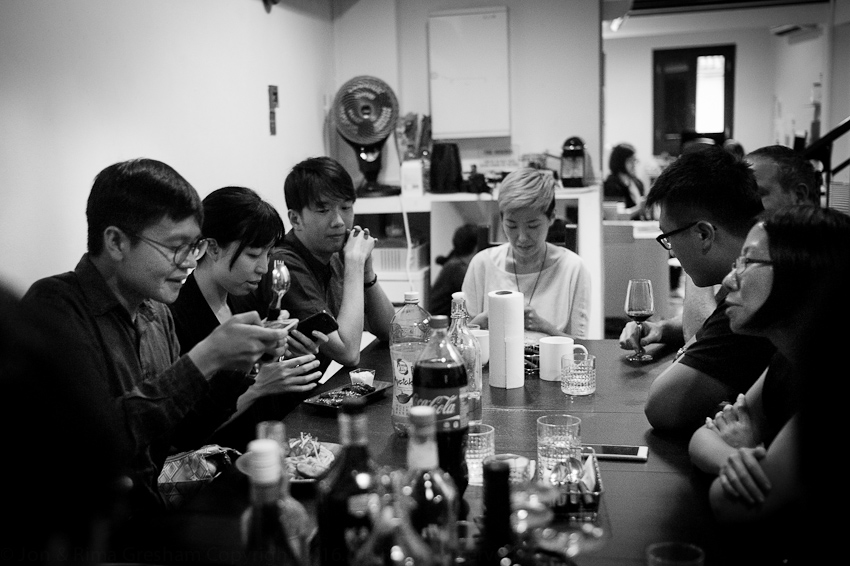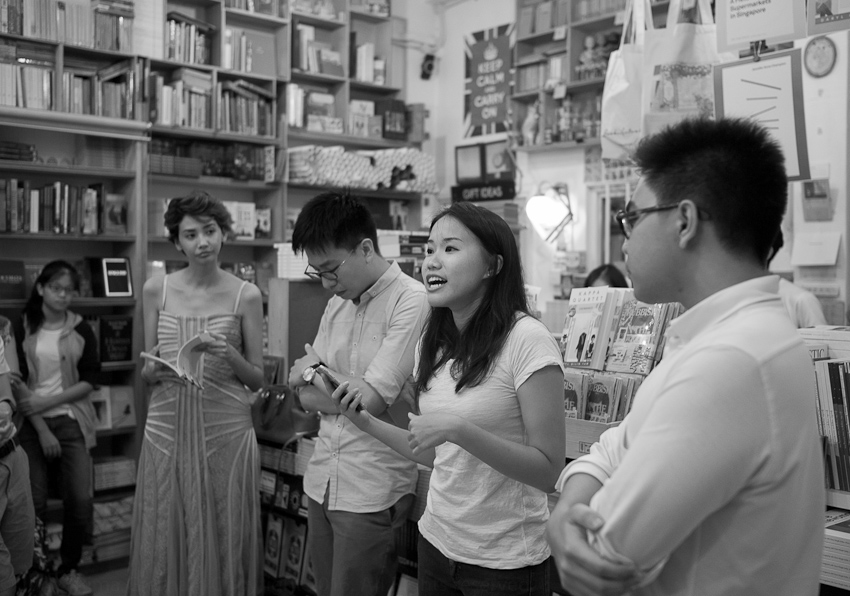|
by Joshua Ip
Many times being a writer feels like living in a lonely outpost in a godforsaken wilderness—the few rare instances every decade that you produce work are your only dispatches back to civilisation, the only way the known world is interrupted by your existence. We often gaze longingly at the distant cities and towns—the economic or academic centres that turn work into currency or curriculum, or the other nexuses of power that award literary acclaim or institutional approval. But sometimes there is a need to lay tracks between the outposts and the cities, to build trains that will bring people to and fro, to erect brightly lit stations with escalators and elevators and, yes, payment gantries and advertisement booths to pay for all this—infrastructure. Sing Lit Station (SLS) is a Singaporean literary non-profit that wants to build infrastructure for the local literary scene. We believe that there is no lack of local talent with the nascent potential to write—Singapore has always been a highly literate country with a tortuously effective educational system. We also believe that there is no lack of desire from Singaporeans to hear local stories written in local voices, accents and flavours. We are a young nation artificially assembled from immigrants of varying vintages with a paper-thin hagiography where a history ought to be; recently affluent enough to afford the luxury of soul-searching: of course the soil is ripe to sow our stories and till our tales.
But for all this hypothetically burgeoning supply and demand, few Singaporeans actually read local work. In a survey of 1,015 Singaporeans conducted by the National Arts Council in 2016, less than 50% read a literary book a year and only 11% had read a piece of Singaporean writing in their life. Being optimistic, a few of us saw this more as an infrastructure problem rather than an incurable national affliction. So in July 2016, several writers sat down and decided to put together Sing Lit Station—an organisation founded to be a platform for Singapore literature. We applied for and received a seed grant from the National Arts Council to run our programmes for the next three years and proceeded to be registered as a charity and an Institution of Public Character, which allows us to effectively raise funds to keep going. We run four core programmes, some of which were going on long before we formally organised:
Singapore Poetry Writing Month (affectionately known as SingPoWriMo) began on the evening of 1 April, 2014 as an online writing exercise between a handful of poets—a fool's challenge to write thirty poems in thirty days. Due to the administrative error of setting the Facebook group to "Public" instead of "Private," to our horror we awoke the next day to find 200 people in the group. Nevertheless, ringleader Alvin Pang tossed out the first writing prompt, and drawn by the increasingly perverse challenges, the group swelled to 500 by the end of the month. Pooja Nansi, Ann Ang and I threw together our favourite pieces into a short anthology, which Math Paper Press generously published. (You can read Collier Nogues review of the anthology here). The group continued to thrive year on year, consistently doubling its membership annually to the consternation of the few volunteer moderators whose job it was to read and comment on everything. The year 2015 concluded with 1,200 members, 2016 ended with 2,500 and we are morbidly confident that the upcoming 2017 session will breach 5,000.
Where do these people come from? The core group of published poets seeking to hone their craft still remains, to the surprise of budding young writers who get to see their literary idols' drafts appear in real-time next to their own efforts. First-time poets of all ages and backgrounds constantly surface with work that surprises with its breadth and depth. Angry activists, satirical trolls, hopeless romantics and passive-aggressive English teachers wage poetic warfare in the threads daily, with their ammunition of choice being obscure Asian poetic forms such as the liwuli, empat perkataan and udaiyaathathu. And, of course, the vast majority of the group consists of literary lurkers, whose shadowy presence is only betrayed by the odd furtive "like." What keeps these new and old writers coming back is the supportive yet critical community, and the effectiveness of social media as a tool for live feedback and commentary on their naked drafts. A team of moderators from Sing Lit Station keeps the conversation civil and puts in a tremendous shift in providing short criticism for most poems, but the highly responsive and comment-happy, community is what makes SingPoWriMo a truly participative platform, where every writer is a reader and vice versa. Such a fecund morass of group-hugging, circle-jerking poetic production surely could never produce anything of quality, cynics may believe. But the (admittedly inconsistent) wisdom of the crowd serves to auto-select outstanding pieces, and the moderators catch most of whatever slips under the net—the best poets quickly develop a reputation, and with some light prodding from the moderators, form themselves into peer writing workshop groups brought together not by some nebulous government-academic selection process, but by a painfully transparent thirty-day public audition.  From left: Tse Hao Guang, Clarissa Goenawan, Daryl Qilin Yam, J Y Yang, Darryl Whetter, Teoh Ren Jie and Ann Ang.
These peer writing workshop groups are the second calling card of Sing Lit Station. We provide the meeting space and conducive accoutrements such as free water, Wi-Fi and Calibri the literary cat. We do not provide a sage / mentor figure raining down the wisdom of the ages from on high—rather we let the poets fight it out very much how they are used to on SingPoWriMo, with a participating moderator who submits poems just like the rest of them, who keeps an eye on the clock to make sure everyone's work gets covered and who occasionally pops in to keep discussion polite and fair. Eight different groups meet in our shophouse unit or other partner locations on a monthly basis now—we have a group dedicated to spoken word, and two groups that are dedicated to serve the migrant worker poet community.
At the other end of the democratic-anarchic free-for-all that is SingPoWriMo, we have our most selective and pinnacle programme—the Manuscript Bootcamp. While Singapore has no lack of writers, our market lacks the scale to sustain a significant number of experienced literary editors. Getting commentary on an individual poem is easily achieved (post it on SingPoWriMo or your writing workshop), but few people are qualified or willing to read your entire manuscript and give you feedback on sequencing, themes, poetics and the other intricacies that go into the development process for a book. Sing Lit Station has now conducted two manuscript bootcamps—one for poetry and one for prose, and will continue to do so in alternate years. As a testament to the success of our bootcamp, manuscripts from three different participants swept the top three prizes for the Golden Point Awards, the largest local prize for unpublished poets.
 (from left): Poets Jennifer Anne Champion, Daryl Lim, Amanda Chong and Samuel Lee read from their debut collections published after the bootcamp. Daryl and Amanda won 1st and 3rd prize respectively at the Golden Point Awards 2015. SLS also funds a small team to run the literary archive website poetry.sg. Finding out everything you need about any notable Singapore poet writing in English is as simple as clicking through their poetry.sg page. Beyond the de rigeur biographies and bibliographies, we have commissioned critical introductions to each poet's body of work and recorded videos of readings by each poet. A separate Malay-language team is already working on adding the Malay poets to the site in 2017, and we hope to cover the rest of the national languages over the next few years. Beyond these four evergreen programmes, we want to continuously challenge the average conceptions of what a literary event should be like. Not for us staid functions in a lecture room or library with choreographed applause and respectful silence while a poet reads. In July last year, fifty poets decked in black SingPoWriMo t-shirts occupied a cabin of a MRT train and read nonstop poetry on the locations they were passing by during the two hours from the first station at Pasir Ris to the Joo Koon terminus. December saw twelve writers running from section to section of the well-loved Books Kinokuniya outlet, screaming section-specific poems prefaced by: "On the first day of Christmas, my true love gave to me … Self-Help Books" (and so on and so forth). This February, we stencilled extracts of local poems in waterproof spray on the sidewalks of the Singapore Art Museum. They are functionally invisible except when it rains, which is every other day in tropical Singapore, and the contrasting colours of dry and wet concrete allow the lines of Daren Shiau and Cheryl Julia Lee to appear as if by magic. (In grand literary tradition, this idea was stolen wholesale from Boston's Mass Poetry, with respectful attribution.) The poets will read their work at the sites of the invisible extracts, while excited young volunteers stand by, waterguns fully loaded. Other conceptually dubious ideas for 2017 include Sing Lit Integrated Zombie Apocalypse, a Dungeon-and-Dragons style mass role-playing adventure with novelists embedded in each group to live-blog a Singaporean zombie novel; and Poetry Body Slam, a very literal performative collaboration between spoken word poets and professional wrestlers. So returning to our original train station metaphor—perhaps these gimmicky ventures are the bright lights and neon signs that bedeck the stations that convince the public that there is life, there is energy and, beneath everything, there are trains worth hopping on and exploring to faraway destinations, all accessible within a short walk from one's home. And as metaphor merges into reality, maybe a bunch of poets randomly reading their work on the MRT while the public curiously looks on (without immediately calling the police) is the kind of progress Singapore needs.
(All photos featured in this post are copyright Jon Gresham. www.igloomelts.com. All rights reserved.) |